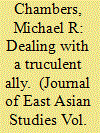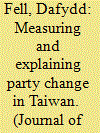|
|
|
Sort Order |
|
|
|
Items / Page
|
|
|
|
|
|
|
| Srl | Item |
| 1 |
ID:
061222


|
|
|
|
|
| Publication |
Jan-Apr 2005.
|
| Summary/Abstract |
The Japanese government today is actively and strategically choosing among various institutional forums to deal with its trade partners, namely bilateral venues, multilateral settings, and even preferential regional arrangements. This ongoing high-profile institutional selection is somewhat unprecedented for Japan, and demands a review of the historical and analytical reasons that drive decisionmakers to select one forum over another. Overall, the Japanese case suggests that the aggregate trade forum choices are influenced both by the desire to institutionalize mechanisms for stabilizing a range of expectations and by the necessity of guaranteeing market access and protection of investment in the fastest time possible.
|
|
|
|
|
|
|
|
|
|
|
|
|
|
|
|
| 2 |
ID:
061221


|
|
|
|
|
| Publication |
Jan-Apr 2005.
|
| Summary/Abstract |
Fearing war on the Korean peninsula as a result of the current nuclear crisis, China has attempted to restrain its risk-taking ally in North Korea and push it toward a negotiated solution. In the process, Beijing has reneged on security commitments made in its bilateral alliance with Pyongyang. We should not be surprised by this behavior because China has acted similarly in other alliances with Asian neighbors. In particular, the PRC has demonstrated a wariness of being dragged into unwanted conflicts, has (since the economic reforms began in 1978) placed its own strategic economic development interests over fulfilling security pledges to allies, and has taught unruly allies a lesson for defying Chinese interests and advice by allowing them to be bloodied in combat. China's refusal to honor its security commitments in order to restrain North Korea and avoid entrapment in an undesired war raises the issue of the future of this alliance.
|
|
|
|
|
|
|
|
|
|
|
|
|
|
|
|
| 3 |
ID:
061224


|
|
|
|
|
| Publication |
Jan-Apr 2005.
|
| Summary/Abstract |
The protest by over half a million people on July 1, 2003, unleashed the most serious crisis of governance in Hong Kong since its retrocession to China in 1997. Triggered by the government's attempt to legislate new national security legislation, it exposed more fundamental institutional defects of an increasingly weakened government. This article puts forward two arguments. First, the political logic of the pre-1997 period was not compatible with the post-1997 political environment and public sentiment, resulting in a widening cognitive gap between government and people. Second, the former colonial administration, despite its nondemocratic nature, was able to secure sufficient public acquiescence and acceptance through economic performance and service delivery. The new government was constrained by both economic and fiscal difficulties and unexpected social crises. A declining capacity to perform effectively had further eroded public support. Attempted reforms of the bureaucracy and the introduction of a new ministerial system had caused greater political-administrative disjunction and actually compounded the crisis of governance.
|
|
|
|
|
|
|
|
|
|
|
|
|
|
|
|
| 4 |
ID:
061223


|
|
|
|
|
| Publication |
Jan-Apr 2005.
|
| Summary/Abstract |
This article examines party platform change in a third wave democratic country, Taiwan, during its first fourteen years of full multiparty elections. A variety of datasets show that Taiwan's parties have moved from polarized positions toward a moderate center on all core electoral issues. However, the parties have not converged into indistinguishable catchall parties; instead they have instituted a state of moderate differentiation. The degree to which Taiwan's parties have moderated and been electorally successful has been intimately tied to the internal balance of power between election-oriented and ideologically conservative factions or leaders. In response to public opinion and electoral competition, Tai-wan's election-oriented leaders attempted to drag their parties toward centrist positions. The key variable constraining convergent party movement and maintaining differentiation has been the strength of ideologically conservative party factions. When these ideologically oriented factions have held the upper hand in parties, they have promoted ideologically orthodox but often unpopular policies. Even when the election-oriented faction is in control at the party center, secondary factions have been able to constrain movement away from party ideals.
|
|
|
|
|
|
|
|
|
|
|
|
|
|
|
|
| 5 |
ID:
061220


|
|
|
|
|
| Publication |
Jan-Apr 2005.
|
| Summary/Abstract |
In the 1990s and into the new century, increased Japanese sympathy toward Taiwan and antipathy toward mainland China led to a series of moves to improve treatment of Taiwan, including enhanced transportation links, a higher level and frequency of official contacts, posting of a military attaché, and expressions of support for Taiwan's participation in regional and international organizations. Nevertheless, Japan remains firmly wedded to a One China policy that opposes both the use of force by the mainland and a declaration by Taiwan of independence from China. Japan's willingness to cooperate with the United States to defend Taiwan is increasingly in doubt. The sources of Japan's supportive but restrained policy include the decline of traditional ties with Taiwan, the increasing size of the mainland market, and above all a perception of security risks that ultimately diverges sharply from that of Taiwan. Serious cooperation in defense and diplomacy requires shared (or complementary) threats, not just shared adversaries.
|
|
|
|
|
|
|
|
|
|
|
|
|
|
|
|
|
|
|
|
|